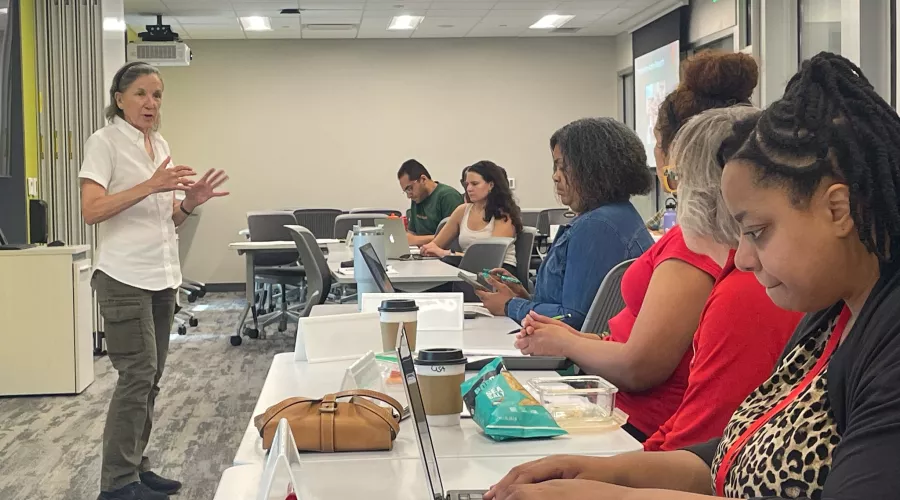Faculty Fellow Spotlight: Dr. Mary Brydon-Miller
Drawing on her extensive background in community-engaged research, Dr. Brydon-Miller has led the Graduate School’s Community Engaged Scholarship Academy, helping to foster cross-disciplinary collaboration and empower scholars to partner meaningfully with communities. April 11, 2025
Dr. Mary Brydon-Miller has served as a Faculty Fellow for the Graduate School from Fall 2024 through Spring 2025, bringing decades of experience in participatory action research to the role. Her work bridges school and community settings, with a current focus on research ethics and institutional transformation in higher education. Drawing on her extensive background in community-engaged research, Dr. Brydon-Miller has led the Graduate School’s Community Engaged Scholarship Academy, helping to foster cross-disciplinary collaboration and empower scholars to partner meaningfully with communities.
This interview has been edited for length and clarity.
1. What initially drew you to community-engaged research?
“When I was an undergraduate student at the University of California, Santa Cruz in the 1970s, I did a study of transportation needs by going down and meeting with older people and talking about their transportation needs. There was not very good public transportation, and it was a huge burden on older people in that community. So I've been doing this for over 40 years. And I think it’s in part, always just seemed like the right way to work to me.
Somebody introduced me to Participatory Action Research, a distinct approach to research that's all about engagement and action and collaboration and community building and respect for people in communities and it's been the through line of my entire career.”
2. Can you speak about the Community Engaged Scholarship Academy’s mission and what you hope participants gain from the experience?
“We want [our students] to have a supportive space within which to practice doing community, engaged research. The transdisciplinary nature of the Community Engaged Scholarship Academy is so important. Everybody brings a different set of skills and traditions to it. And I think it is really helpful to the students to see what the range of possibilities is.
Transdisciplinary research can only be fostered if you have an opportunity to have relationships with people across different colleges, and parts of the university. You know, how do I learn to work with engineers? How do engineers learn to work with people in business analytics? How do they learn to work with people from the social work school?
The ripple effects of students in all these different areas (...) developing community partnerships (...) allows us to really broaden the impact of what we as a university are able to do in terms of supporting the community that we are part of. And it [helps us] live up to the mission of the university as a community engaged university, by providing people with tools to do that going forward.”
3. You work with institutions across the U.S. and internationally. How do these partnerships, along with your collaboration with the UofL Graduate School, enhance the work you’re doing at UofL and in the community?
“So, for the past eight years I've been working with an organization called the Gloucestershire Gateway Trust. It's a social enterprise, meaning it is a business that generates money that provides support for asset-based community development in southwest England. And the business is a motorway services center, so it's like a Thornton's gas station basically, but a gas station unlike any other in the world.
We had people from the Gloucestershire Gateway Trust as part of a day long workshop that we did with the Community Engaged Scholarship Academy. [They] talked about what they were doing and one of the people who attended was from the Healing Place here in Louisville, and [now] they want to start a social enterprise. So, we’re developing a relationship to support their social enterprise project, based on the one in England. It’s really neat and it’s really fun.”
4. What advice would you give to graduate students or early-career scholars who want to make an impact through community-engaged scholarship?
“To understand that everyone has knowledge and skills and experiences to bring to the table, and this has got to be a collaborative process. It's the coming together of local knowledge and expert knowledge in a mutually respectful way that really creates the space for positive change.”
